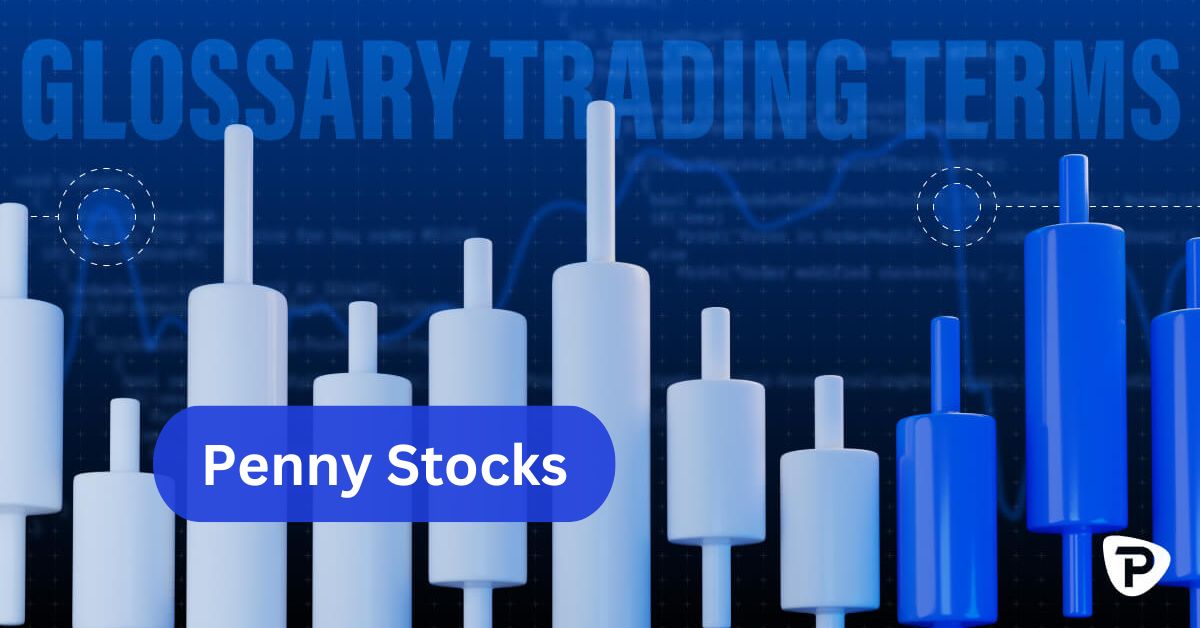Penny Stocks
Penny stocks are often found outside major exchanges like the New York Stock Exchange (NYSE) or NASDAQ, commonly on over-the-counter (OTC) markets or smaller exchanges.

Penny stocks definition
Known for their high volatility and high risk, penny stocks attract speculative investors and traders who are willing to take on the potential for high reward but also face the possibility of substantial loss.
Key characteristics:
- Low share price: Penny stocks are generally priced below $5, making them accessible to investors with limited capital
- High volatility: The prices of penny stocks can fluctuate dramatically within a short period, potentially leading to sizable gains or losses
- OTC trading: Many penny stocks are traded over-the-counter (OTC), or on smaller indices like the AIM (Alternative Investment Market). These markets typically involve lighter regulatory requirements compared to major exchanges.
- Low market capitalisation: These stocks belong to companies with smaller market caps, meaning their total value in the stock market is relatively low
- Limited liquidity: Due to low trading volumes, penny stocks often experience comparatively wider spreads than higher-volume markets.
Advantages:
Penny stocks offer several potential advantages for traders, primarily due to their price volatility and low initial capital requirements. The significant price fluctuations associated with penny stocks create opportunities for traders to realise substantial gains in a short amount of time. Additionally, because these stocks are typically priced below $5, they provide an accessible entry point for those with limited capital. This means that even with a small amount of money, traders can purchase many shares, potentially maximising their returns if the stock price rises. However, weighing these benefits against the higher risks is important.
Risks:
- High volatility: While volatility can lead to big profits, it can also result in significant losses in a very short period
- Limited regulation: Many penny stocks are traded on OTC markets with less stringent regulatory oversight, increasing the risk of fraud and manipulation
- Low liquidity: It can be difficult to sell penny stocks quickly without affecting the price, making it harder to exit a position
- Market manipulation: Penny stocks are often targets of schemes like ‘“pump and dump’,” where promoters artificially inflate the price to sell their shares at a profit, leaving unsuspecting investors with heavy losses.
Example:
Imagine buying 1000 shares of a penny stock at $0.50 per share, for a total of $500. Over a few weeks, the stock price increases to $0.75, bringing the value of your investment to $750. However, it’s important to remember that the stock price could just as easily fall and result in a loss.
The material provided here has not been prepared in accordance with legal requirements designed to promote the independence of investment research and as such is considered to be a marketing communication. Whilst it is not subject to any prohibition on dealing ahead of the dissemination of investment research we will not seek to take any advantage before providing it to our clients.
Pepperstone doesn’t represent that the material provided here is accurate, current or complete, and therefore shouldn’t be relied upon as such. The information, whether from a third party or not, isn’t to be considered as a recommendation; or an offer to buy or sell; or the solicitation of an offer to buy or sell any security, financial product or instrument; or to participate in any particular trading strategy. It does not take into account readers’ financial situation or investment objectives. We advise any readers of this content to seek their own advice. Without the approval of Pepperstone, reproduction or redistribution of this information isn’t permitted.